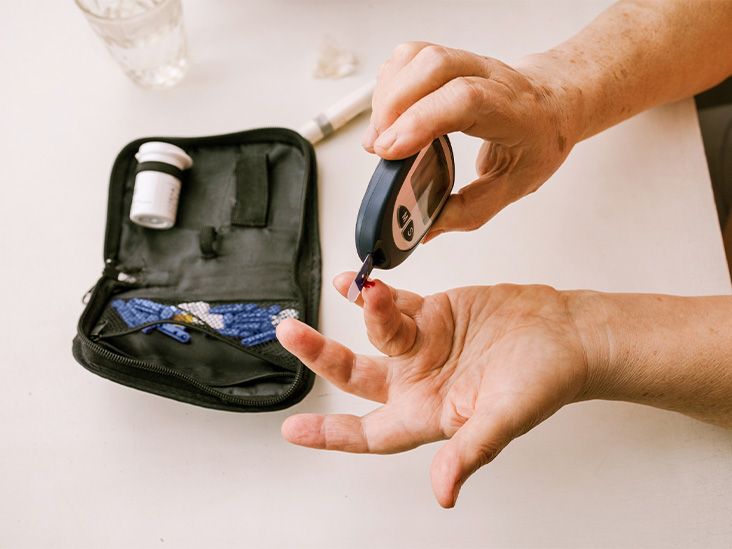Symptoms of menopause can include hot flashes, irregular periods, mood changes, night sweats, breast soreness, vaginal dryness, bloating, thinning hair, and more.
Menopause refers to the stage of a person’s life during which their period stops. It typically occurs around the age of
The years leading up to menopause are called the menopausal transition, or perimenopause. This stage can also come with symptoms, which may last for several years — sometimes up to 14 years.
This article looks at the 34 symptoms of menopause and what may help.
A note about sex and gender
Sex and gender exist on spectrums. This article will use the terms “male,” “female,” or both to refer to sex assigned at birth. Click here to learn more.

Menopause and perimenopause can cause a range of symptoms that may vary from person to person.
1. Hot flashes
Hot flashes are among the
2. Night sweats
Night sweats are hot flashes that occur at night. Scientists are not sure why they occur, but it appears that falling estrogen levels can affect the hypothalamus, which regulates body temperature.
3. Irregular periods
Throughout the menopausal transition, it is natural to have irregular or missed periods. Eventually, a person
4. Mood changes
Mood changes are unpredictable shifts in mood unrelated to life events. They can cause someone to feel suddenly sad, weepy, or angry. Mood changes
Learn more about mood changes during menopause.
5. Breast soreness
Breast tenderness is another common symptom of menopause, though its frequency tends to decrease in the later stages.
Learn more about menopause and sore breasts.
6. Decreased libido
Menopause also
However, it can also be a secondary result of the other symptoms of menopause, such as mood changes or a side effect of a medication.
Learn more about menopause and libido.
7. Vaginal dryness
As female sex hormones ensure that there is adequate circulation of blood around the vagina, a lack of them
8. Headaches
Someone entering menopause may experience
However, unlike during a typical menstrual cycle, hormone levels during perimenopause can fluctuate more unpredictably.
Learn more about migraine and menopause.
9. Recurring UTIs
Urinary tract infections (UTIs) become more common after menopause. This is most likely due to the drop in estrogen that occurs following menopause. This drop causes the vaginal tissues to thin, leading to dryness, irritation, and other factors that make it easier for a UTI to develop. UTIs are recurrent if a person experiences three or more in 1 year or two or more within 6 months.
A person can help prevent UTIs in
- using probiotics
- consuming cranberry juice
- taking d-mannose supplements
A person can discuss treatment and prevention of UTIs with their healthcare professional.
Learn more about menopause and UTIs.
10. Burning mouth
A burning mouth is another potential symptom of menopause
The mucus hormones in the mouth have sex hormone receptors, which decrease with a decline in estrogen. This can contribute to pain and discomfort.
Learn more about burning mouth syndrome.
11. Changes in taste
Some people
12. Fatigue
Fatigue can be a distressing and
13. Acne
Acne is a condition that people commonly associate with adolescence. However, a
The American Academy of Dermatology Association (AAD) states that because a person’s skin typically becomes drier and thinner, typical acne treatments can be too harsh. The AAD recommends the following ways to help treat and prevent menopausal acne:
- Washing the face using a product that contains salicylic acid.
- Avoiding acne products that may dry the skin.
- Consulting a dermatologist if acne is unmanageable.
14. Other digestive changes
Female sex hormones
15. Joint pain
Estrogen helps decrease inflammation and keep the joints lubricated. As a result, some people experience joint pain due to decreased estrogen.
Estrogen is responsible for regulating fluid levels throughout the body, so when the body becomes low in this hormone, females are more prone to joint aches or menopausal arthritis.
16. Muscle tension and aches
Individuals experiencing perimenopause or menopause can also develop muscle tension or aches. This is due to the same factors as menopausal joint pain.
17. Electric shock sensations
Some people can experience sensations that resemble electric shocks during perimenopause and menopause. It is not clear what causes this, but it may be the result of changing hormone levels in the nervous system.
18. Itchiness
As estrogen is related to collagen production and skin hydration, a decline in this hormone
Get tips for managing itching during menopause.
19. Sleep disturbance
An individual’s sleep
Learn about menopause and insomnia.
20. Difficulty concentrating
A decline in estrogen
21. Memory lapses
As with concentration and focus, menopause can also affect memory. Again, this could be a direct result of lower estrogen levels or compromised sleep.
22. Thinning hair
During menopause, hair loss or thinning is another
Find tips on the best shampoos for menopausal hair loss.
23. Brittle nails
During or after menopause, the body
24. Weight gain
Individuals can gain weight due to
Read about menopause and weight.
25. Stress incontinence
Stress incontinence refers to a frequent or sudden urge to urinate. Some people also refer to it as an “overactive bladder.” This symptom
26. Dizzy spells
Hormonal changes in menopause
Learn more about menopause and dizziness.
27. Allergies
28. Osteoporosis
During perimenopause, a decline in estrogen can also result in a loss of bone density. In severe cases, this
29. Irregular heartbeat
Some people may experience an irregular heartbeat or palpitations during or after menopause. It is always a good idea to discuss symptoms relating to the heart with a healthcare professional.
Learn about palpitations and menopause.
30. Tinnitus
Tinnitus is a symptom that involves hearing a sound that has no external cause. This can include a ringing in the ears, roaring, or buzzing. It may affect one or both ears. Other signs of tinnitus may
- whistling
- humming
- clicking
- hissing
- squealing
While the exact prevalence is unknown, a
31. Irritability
Either due to hormonal fluctuations or the effect of other menopause symptoms, people experiencing this change
32. Depression
For some people, hormonal imbalances may trigger depression. A lack of sleep and stress can contribute to this.
In some cases, menopause may trigger depression or low mood because of the change it signifies in a female’s life. Any significant life change can play a role in depression, even if the change is a positive one.
Learn more about menopause and depression.
33. Anxiety
Anxiety is another mood-related symptom that some people experience during menopause. It may worsen at night or only occur intermittently as hormone levels fluctuate.
Both menopause-related depression and anxiety may be situational and improve once hormones level out.
Learn more about menopause and anxiety.
34. Panic disorder
In some cases, individuals may experience panic attacks during menopause. When these attacks occur unexpectedly or suddenly, they can indicate panic disorder. This may happen due to hormonal changes or the fear of feeling anxious itself.
Find out more about panic attacks and panic disorder.
Most people do not experience all 34 of these symptoms during menopause.
There are several treatments that a person can try to reduce discomfort, including:
- HRT, which temporarily replaces hormones such as estrogen
- vaginal estrogen, which can improve lubrication and prevent dryness
- antidepressants, which can reduce mood-related symptoms and improve hot flashes
There are also several lifestyle changes and self-care practices that can help alleviate symptoms, such as:
- avoiding alcohol, spicy foods, and caffeine, as these can
worsen hot flashesTrusted Source - stopping smoking, if necessary
- dressing in layers so that it is easier to cool down when a hot flash occurs
- carrying gentle cleansing wipes to freshen up while on the go
- getting regular exercise can help with weight management, stress relief, and mood changes
- learning relaxation techniques, such as breathing exercises or mindfulness
- having psychotherapy, which can provide a place to talk about the effects of menopause
Learn more about natural remedies for menopause symptoms.
If an individual is experiencing new or unexplained symptoms, they should speak with a healthcare professional. Other health conditions can cause the symptoms associated with menopause, so it is important to rule these out.
Individuals should also consider speaking with a healthcare professional if their menopause symptoms are causing distress or disruption to their lives. If they are having difficulty sleeping, finding it difficult to work, or experiencing severe mood changes, some treatments may help.
Among the most common symptoms of menopause are hot flashes, mood changes, fatigue, and irregular periods. However, people experience menopause differently.
It is important that healthcare professionals rule out other potential explanations for these symptoms, as menopause is not the only factor that could cause them.


